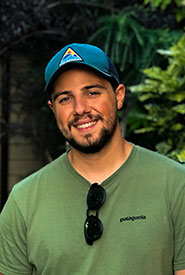Learning from Indigenous leadership in Haida Gwaii (part two)
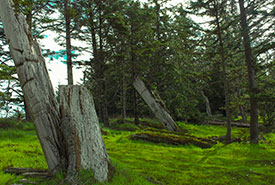
The K'uuna Llnagaay (Skedans) village site and monumental poles, a Haida Heritage Site I visited with Haida Style Expeditions. (Photo by Janel Saydam)
Having studied environment and sustainability at the University of British Columbia for my undergrad, there are many things I learned that have made me lose hope in the future of the planet and the humans that rely on its integrity. One of my greatest fears is that we have become so disconnected from nature that we have forgotten to value its gifts.
Seeing how the Haida culture and leadership have been able to reconnect Indigenous and non-Indigenous people to the land has given me hope in the power of reaffirming and understanding our connection and relations to nature. The Haida Nation has held on and fought to preserve this intimate understanding of the world and its complexity. These are values everyone can learn from.
Related content
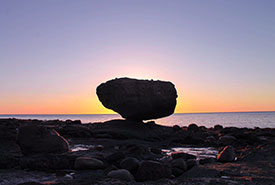
“The Balance Rock” at sunrise. Visiting this place was one of my first moments in Haida Gwaii and it foreshadowed what I would learn about balance throughout my time there. (Photo by Janel Saydam)
In the Haida language, there are two sayings that really stuck with me. The first is “Yahguudang,” which means "respect for all living things." The second, “Gina ‘waadluxan gud ad kwaagid,” means "everything is connected to everything else."
The connection and understanding that people have for their environment in Haida Gwaii made me smile at times. The biggest topics of discussion when I was there were the dying salal bushes (a shrub common on BC’s West Coast), declining salmon populations and the impact of invasive deer. It was common to overhear conversations at a local café theorizing about why the salal was turning brown, or complaining about how the irregular sunny weather might affect the local environment and how that might affect people’s livelihoods.
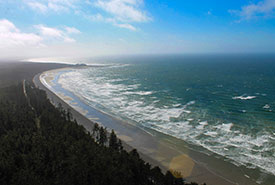
Waves getting blown onto North Beach by powerful 30+ knot northwesterly winds, which I later felt the full force of while camping on behind the trees on the beach below. (Photo by Janel Saydam)
Time and time again, the locals, Indigenous and non-Indigenous alike, revealed to me a deep-found respect for natural systems and a deep understanding of the human connection to these systems. It was this sense of understanding from the average person there that humbled me. I went from feeling like a nature expert when I was among my friends in the city to feeling like a newborn baby with a lifetime of learning ahead of me.
Before I went to Haida Gwaii, I had uncomfortable preconceptions that I would be treated as an outsider. How could someone like me, who has spent their entire life in cities, possibly be welcomed to a place that’s so remote and out of my norm?
After I had spent a month and half there, Haida Gwaii quickly became the place where I felt the most comfortable and welcome in my life.
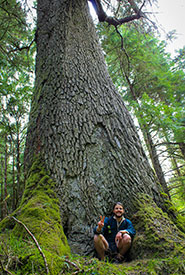
A picture of me next to an ancient Sitka Spruce, common in old-growth coastal-temperate rainforests throughout Haida Gwaii and BC’s west coast. (Photo by Janel Saydam)
Countless times. I would be offered help without asking, or someone who I had just met would seek me out just to share a new experience with me. I quickly learned that there is a strong culture of sharing, giving and reciprocity that I had never experienced before. It helped me understand the potential of humanity when we prioritize developing relationships with each other and to our environment.
I was amazed that such a place and people could exist. Haida Gwaii is very diverse, made up of Haida and non-Indigenous Peoples with diverse backgrounds. Indigenous leadership, alongside open-mindedness and collaboration, has created this unique and fascinating place. As Canada is heading into a new future of relationships with Indigenous communities, my experience gave me a sample of what the future might hold for our country, and it is incredibly exciting.
Haawa (thank you) to the Haida Nation for allowing me to grow and learn so much in their territory. And thank you to the Haida Gwaii Institute for providing me with the opportunity to participate in the program.

